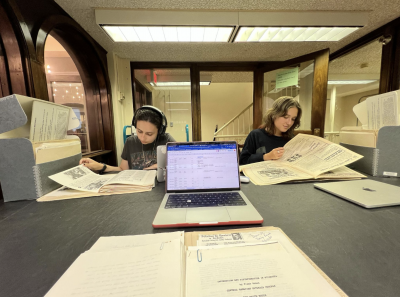Trinity Communications

Applications are now open for the second session of History+ — a 10-week paid mentored summer research program.
In its inaugural year, History+ expanded the range of research opportunities for History department undergraduates by providing a program for them to become fully immersed in one single research project for multiple weeks.
“Before History+, I struggled to find opportunities outside of class that allowed me to engage in novel research projects,” said Veronica Sanjurjo (T’25) who worked on the “LatinX History and Conservatism” project team. “The History+ program has completely altered the research space for history undergrads at Duke.”
Over the summer, Sanjurjo and other students in the inaugural History+ cohort worked as researchers in teams directed by a faculty mentor and a graduate student project leader. Each project team was tasked with achieving specific outcomes by the end of the summer session — outcomes with practical results and tangible impact, like museum exhibits, oral histories and archival guides.
“The History+ experience gave me the confidence to do historical research — something that is often preserved for higher academia.” — Veronica Sanjurjo (T’25)
“For some students, this was their first time in an archive,” said faculty project mentor, Cecilia Márquez, Hunt Family Assistant Professor of History. “But by the end of the summer, they were seasoned archive veterans.”
Historical research can be solitary work, but the History+ program provides an opportunity for students to engage in rich research projects, rooted in a communal learning environment.
“My favorite thing about my History+ project was working with a group of fellow undergraduates,” Sanjurjo said. “Archival work can often feel isolating but working in a group made it engaging and allowed us to share findings with each other, connecting pieces of history along the way.”
The History+ program also allows students to give back to the Durham community, as most projects involve collaborations with local nonprofit organizations seeking to learn more about their past and legacy.
“By helping local organizations recover knowledge, we’re providing an example of how Duke and Durham can engage collaboratively,” said Gilhuly Family Associate Professor of History James Chappel. “History+ gives students the opportunity to conduct research that will actually be used by community partners in Durham, while building important skills that today’s employers value, like collaboration and teamwork in pursuit of shared goals.”
Applications for History+ 2025 are now open.
History+ is a 10-week summer collaborative undergraduate research program run by the Duke History Department.
In 2025, the program is offering seven projects on a variety of topics. Students will learn how to use historical research skills while working together as a team and engaging with community partners, putting their academic knowledge into practice.
The summer program will run from May 20 to July 11, 2025 and participants receive a stipend.
To apply, complete and submit an application by Friday, February 14, 2025.
For more information, visit the History+ 2025 website.
The 2025 History+ program offers a lineup of exciting projects for undergraduate researchers.
In one project, students will work with the Duke Center for Firearms Law, based at Duke Law, to locate historical gun regulations in local archives, research the context of those laws, and gain an understanding of how the historical record is relevant to modern-day litigation.
Another 2025 project focuses on the long history of Catawba Trail Farm, a former plantation located in North Durham currently administered by Urban Community AgriNomics (UCAN), a nonprofit addressing issues of local food insecurity. Students will collaborate with UCAN and the North Carolina Lives and Legacies Project to research the history of the land and prepare public-facing exhibits.
A project for students interested in the housing crisis, urban planning, and public policy involves working with Habitat for Humanity Durham to help the organization answer research questions about its 40-year history for an in-person and online exhibit: How many houses have been built? Where are those houses located? How have those homes impacted the lives of those who live there?
For students interested in local public history and the history of women, the Durham Chapter of the Junior League, founded in 1928, has a project for students to explore and process records, scrapbooks and photo albums to create a timeline and web resource to celebrate the work of the League and its impact on Durham.
Other 2025 History+ projects include researching the history of a little-known 19th century church founded by Washington Duke's brother, William J. Duke; environmental justice initiatives from Durham’s People’s Alliance during the 1980s and 1990s; and LGBTQ+ organizing and activism in Durham in support of an exhibit at the Museum of Durham History.
To learn more about these experiences, along with all other Duke Plus programs, students can attend the +Programs Fair on January 16, 2025 from 1-3 pm in Gross Hall.
The 2025 History+ summer program will run from May 20 to July 25, and accepted students will receive a stipend between $1,000 and $5,000.
Applications are due by February 14, 2025. For more information, visit the History+ 2025 website.